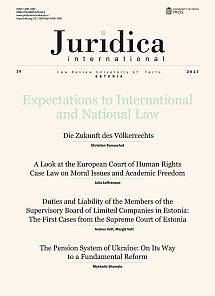Dear reader,
DOI:
https://doi.org/10.12697/JI.2017.26.00Abstract
In looking at the collection of papers in this volume, an impression of a certain eclecticism cannot be avoided. We have articles on public international law, European human-rights law, legal history, and various aspects of Estonian law, but also, for example, issues in Ukrainian law are dealt with. Moreover, while most of the articles are in English, some key papers are in German, which in times gone by was the lingua franca of the Baltic intellectual universe.
Although the substantive themes of this edition of Juridica International are inevitably varied, it seems to me nevertheless that the diverse legal domains and questions all are connected with the expectations that we as lawyers and citizens have for law – be it international, regional, or domestic.
Christian Tomuschat’s programmatic article on the current state and future of public international law is connected with a festive event that we celebrated at our university on 1 December 2016, when Professor Tomuschat received an honorary doctorate from the University of Tartu. In this capacity, he has joined the ranks of other distinguished individuals who have become honorary doctors in the field of law here: Boris Meissner (1996), Heinrich Mark (1998), Peter Schlechtriem and Thomas Wilhelmsson (2002), Wilfried Schlüter (2003), Tarja Halonen (2004), Christian von Bar (2007), Werner Krawietz (2008), Erik Nerep (2011), and Joachim Rückert (2014).
The question of international law’s future is inevitably linked to the expectations we hold for that law. Professor Tomuschat demonstrates how international law became universal and how this has influenced expectations of it. Of course, the higher the expectations are, the easier it is to fall short of them. When the case load of the European Court of Human Rights became too heavy on occasion, some people said that the Court had become a victim of its own success. In this issue, Judge Julia Laffranque reflects on ethical foundations of, and expectations for, European human-rights law and its interpretations.
Legal history, in turn, reminds us that the issue of expectations of law is an age-old one. Ideas from natural law have lived in an uneasy relationship with pure legal positivism. Especially in dictatorships, law does not correspond to ethical standards characteristic of democracies. In some cases, law has even become a tool of outright repression. The Radbruch Formula, known from the history of legal debate in Germany, has not lost its topicality.
What are the expectations for national law? We usually expect best practices and legal models – to the extent that these can be established – to be followed. We expect legal certainty and a certain rationality and logic behind the law. Yet law can be likened to Estonia’s capital city, Tallinn, which according to an ancient legend will never be ‘ready’: it can never be complete. Expectations for law are particularly high in countries in transition, such as Ukraine. The University of Tartu (formerly Dorpat) had important links to universities in Ukraine already in the 19th century, and now we keep our fingers crossed that Ukraine will be able to pursue its own strong statehood based on democratic values.
What are the expectations for legal scholarship? Since the readers of legal writings are educated in jurisprudence, we all expect to become more enlightened, to find clarification for things that we were not aware of or that we knew less about. If this volume of Juridica International succeeds with that in its readers’ eyes, it has done well enough.


